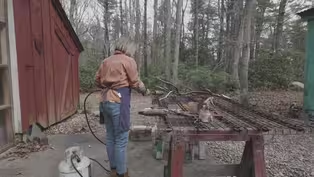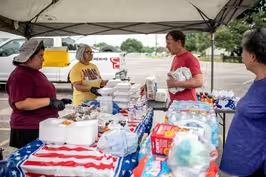
The impacts of Trump's SNAP and Medicaid work requirements
Clip: 7/7/2025 | 6m 18sVideo has Closed Captions
Who will be affected by Trump administration's Medicaid, SNAP work requirements
President Trump’s big tax law includes a major provision the GOP has endorsed for years: work requirements for Medicaid recipients and for food stamp benefits. The Congressional Budget Office estimates that 11.8 million Americans could lose medical coverage over the next decade and more than 3 million could lose SNAP benefits. Laura Barrón-López discussed the stakes with Pamela Herd.
Problems playing video? | Closed Captioning Feedback
Problems playing video? | Closed Captioning Feedback
Major corporate funding for the PBS News Hour is provided by BDO, BNSF, Consumer Cellular, American Cruise Lines, and Raymond James. Funding for the PBS NewsHour Weekend is provided by...

The impacts of Trump's SNAP and Medicaid work requirements
Clip: 7/7/2025 | 6m 18sVideo has Closed Captions
President Trump’s big tax law includes a major provision the GOP has endorsed for years: work requirements for Medicaid recipients and for food stamp benefits. The Congressional Budget Office estimates that 11.8 million Americans could lose medical coverage over the next decade and more than 3 million could lose SNAP benefits. Laura Barrón-López discussed the stakes with Pamela Herd.
Problems playing video? | Closed Captioning Feedback
How to Watch PBS News Hour
PBS News Hour is available to stream on pbs.org and the free PBS App, available on iPhone, Apple TV, Android TV, Android smartphones, Amazon Fire TV, Amazon Fire Tablet, Roku, Samsung Smart TV, and Vizio.
Providing Support for PBS.org
Learn Moreabout PBS online sponsorshipAMNA NAWAZ: President Trump's big tax law includes a major provision the GOP has endorsed for years, work requirements for Medicaid recipients and for food stamp benefits known as SNAP.
Millions now are at risk of losing coverage in what would be the largest cuts to the social safety net since the 1990s.
Laura Barron-Lopez has the details.
LAURA BARRON-LOPEZ: Amna, in order to receive Medicaid, able-bodied childless adults between the ages of 18 and 64 will have to prove they're either working, in school, or doing community service for 80 hours a month.
The Congressional Budget Office estimated that 11.8 million Americans could lose coverage over the next decade because recipients may struggle to navigate the new paperwork, miss deadlines, or simply not apply at all.
Another work requirement change could result in more than three million Americans losing SNAP benefits, according to an earlier CBO estimate.
To help us understand the stakes, I'm joined by Pamela Herd, professor of social policy at University of Michigan's Ford School of Public Policy, who watches this all very closely.
Professor Herd, thank you so much for joining the "News Hour."
PAMELA HERD, University of Michigan: Thank you so much for having me.
LAURA BARRON-LOPEZ: To start, who is going to be affected by this new Medicaid work requirement provision and what kind of challenges will people face to meet these new paperwork requirements?
PAMELA HERD: So, really, in the end, the majority of Medicaid beneficiaries will be affected, either because you actually have to meet the work requirement yourself, or you have to demonstrate that you're exempt from meeting that work requirement.
So, you have a very young child, or you have a disability, or you're in school.
So, the majority of Medicaid recipients or anyone applying to Medicaid ultimately is affected by these changes, and the large amount of additional paperwork and administrative complexities they will have to navigate to do just that.
LAURA BARRON-LOPEZ: What will some of those new paperwork rules require from people?
PAMELA HERD: Well, at a minimum, individuals are going to have to prove much more frequently now that they're still eligible.
So if you're on the program, you need to show for that work requirement.
For example, every six months, the state -- at a minimum, every six months, states will have to verify that people are still meeting that work requirement.
So it's a lot of additional kind of paperwork and documentation that you're going to have to submit, and/or the state is going to have to figure out how to verify independently without interacting with people.
But given the complexities of these rules, it's hard for me to imagine that it isn't going to require a lot of additional work for beneficiaries and applicants.
LAURA BARRON-LOPEZ: The White House and Republicans say that they are making these new work requirements in order to root out waste and fraud.
I want to know what your response is to that, and is there any reason to increase people's reporting requirements in this way?
PAMELA HERD: Yes, there isn't a lot of good evidence that this would be a way to fix any kind of, which there isn't a lot of evidence that there's a lot of waste, fraud, and abuse in the Medicaid program on behalf of beneficiaries, at least.
The large amount of money in Medicaid or Medicare, for that, matter that is a function of waste and fraud is actually providers manipulating the benefit system.
Really, what will happen is these beneficiaries are going to end up navigating people who -- the majority of Medicaid beneficiaries effectively currently either meet -- already meet that work requirement or they already meet one of the exception categories.
The vast majority of people already do.
LAURA BARRON-LOPEZ: Another work requirement change is going to apply to food stamps.
How do those new work requirements compare to the ones for Medicaid, and who exactly are they going to affect the most?
PAMELA HERD: So, similar to the Medicaid requirements, the enhanced -- SNAP already does have work requirements.
It's just expanding basically the pool of people that those work requirements apply to.
And I think the really important thing to understand, what we already know about SNAP work requirements is that they don't actually increase labor force participation.
Any time SNAP work requirements have been expanded, all that they have done is effectively kick off people from the program.
It doesn't actually enhance labor force participation.
So they don't tend to meet the stated goals, which are to increase labor force participation.
LAURA BARRON-LOPEZ: How are states going to go about implementing these work requirements?
And are there any states that you think could find a way to make it less burdensome for recipients to now meet this new paperwork rules?
And could that be successful?
PAMELA HERD: You know, that's the million-dollar question, which is, will states actually be able to implement that?
And I think we have a lot of evidence already that states are going to struggle a lot with the implementation of this.
It's very costly to implement.
It's administratively complicated.
And most states, quite bluntly, don't have the tools in their toolbox, especially when they only have about a year to roll this out to do it effectively.
And we have evidence of this.
Georgia, for example, has a Medicaid work requirement.
They have spent $90 million on that work requirement, and only $26 million have gone to beneficiaries.
The vast majority of the spending has gone to administrative costs.
So if that's what we're looking at for most states, it's hard not to see this as an incredibly costly tool to implement, and also one that we have seen in other states, both Georgia and Arkansas, where ultimately most people who end up losing their benefits were actually still eligible.
They just couldn't navigate those administrative processes.
LAURA BARRON-LOPEZ: Pamela Herd of the University of Michigan, thank you for your time.
PAMELA HERD: Thank you very much.
'2024' offers inside look at election's twists and turns
Video has Closed Captions
Clip: 7/7/2025 | 7m 35s | New book '2024' offers inside look at twists and turns of the presidential election (7m 35s)
Exiled artist transforms nature into works of art
Video has Closed Captions
Clip: 7/7/2025 | 5m 15s | Artist exiled from homeland transforms nature into works of art (5m 15s)
Local groups aiding recovery efforts after Texas floods
Video has Closed Captions
Clip: 7/7/2025 | 5m 48s | How local groups are aiding recovery efforts after devastating Texas floods (5m 48s)
A look at the latest Gaza ceasefire proposals
Video has Closed Captions
Clip: 7/7/2025 | 4m 56s | A look at the latest Gaza ceasefire proposals as Netanyahu visits White House (4m 56s)
News Wrap: Man killed after firing on Border Patrol facility
Video has Closed Captions
Clip: 7/7/2025 | 5m 54s | News Wrap: Man killed after opening fire on Border Patrol facility in Texas (5m 54s)
Tamara Keith and Amy Walter on Musk's new party
Video has Closed Captions
Clip: 7/7/2025 | 7m 30s | Tamara Keith and Amy Walter on disaster response and Musk's new party (7m 30s)
Texas flooding death toll surpasses 100
Video has Closed Captions
Clip: 7/7/2025 | 9m 16s | Texas flooding death toll surpasses 100 as hope for finding survivors fades (9m 16s)
Providing Support for PBS.org
Learn Moreabout PBS online sponsorshipSupport for PBS provided by:
Major corporate funding for the PBS News Hour is provided by BDO, BNSF, Consumer Cellular, American Cruise Lines, and Raymond James. Funding for the PBS NewsHour Weekend is provided by...


















